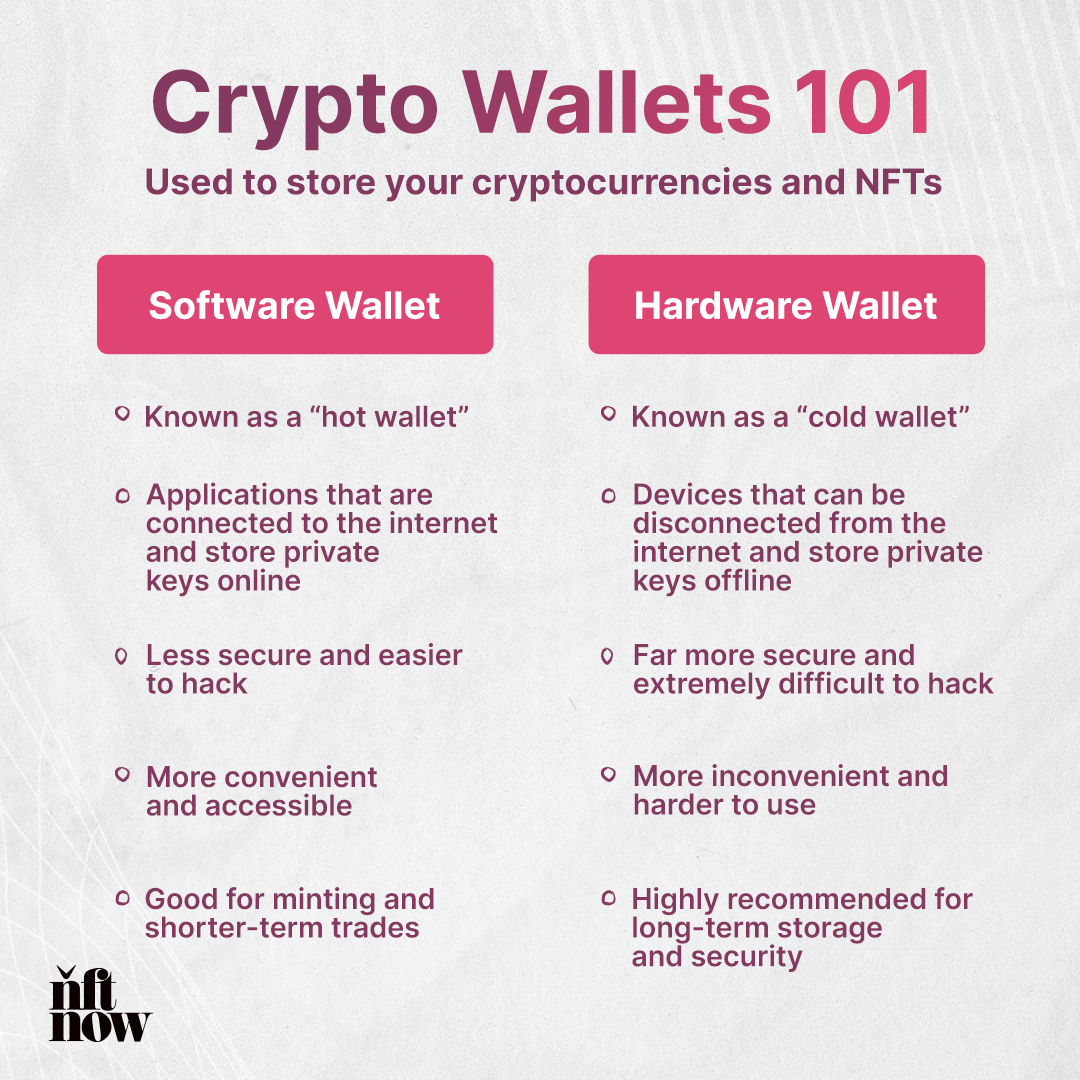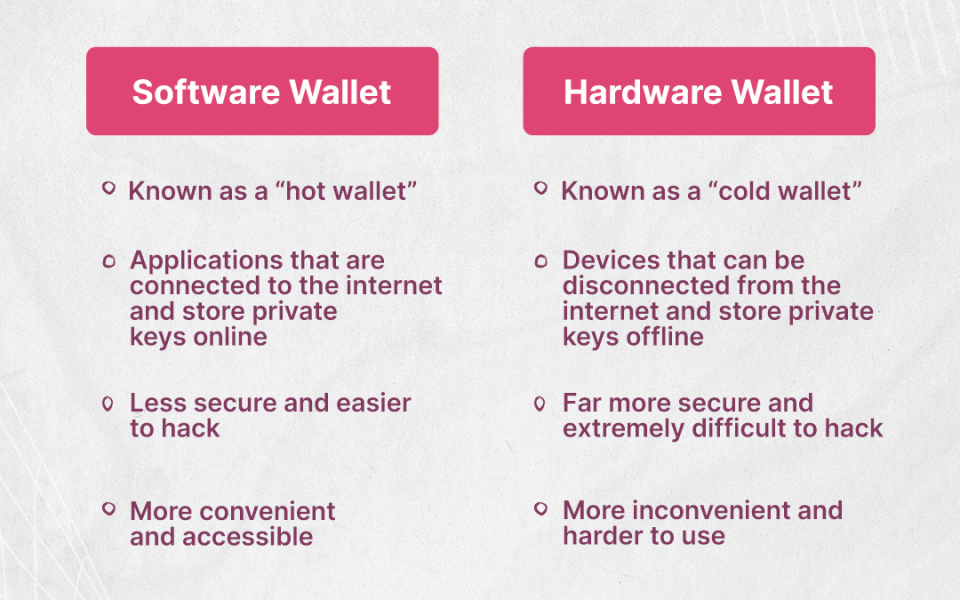Everything You Need to Know About Crypto and NFT Wallets
You can take a dollar bill, fold it in half, and carry it around in your pocket. Or you can stack all your bills together and store them in a safe. Unfortunately, you can’t do the same with crypto and NFTs. So, before you get started with NFTs, you’ll need something to store your crypto and the digital assets you acquire in the crypto space. This is where crypto wallets come in.
In short, a crypto wallet is a physical device or computer program that allows you to store and transfer digital assets.
How do crypto wallets work?
As you might expect, crypto wallets involve a bit of technical jargon. However, the way they work is really rather simple. In short, when you create a crypto wallet, it automatically generates a series of words known as a “seed phrase” (also called a “recovery phrase”). The wallet uses the seed to create private keys. Never ever share your seed phrase or private keys with anyone or they will be able to access your assets!
To understand how all of these things work together, it helps to think of a crypto wallet as a password manager for your digital assets. In this analogy, your seed phrase acts as the master password for your wallet – it allows you to access your crypto wallet. If you delete your crypto wallet, you can recreate it and access everything in it using your seed phrase.
However, if you lose or forget your seed phrase, you lose access to your wallet and all the assets it contains — forever. Private keys are like passwords. They allow you to access and manage the specific items in your wallet. Specifically, your private key lets you initiate transactions, which is called “signing.”
What’s a hot and cold wallet?
There are two basic types of crypto wallets: software and hardware wallets.

A software wallet (also known as a “hot wallet”):
This is an application that can be downloaded and installed on your desktop or mobile device. Popular examples include MetaMask, WalletConnect, Rainbow Wallet, and more. Generally, software wallets are more convenient and can be accessed more easily than hardware wallets because private keys are stored online and the wallet is always connected to the internet. Many marketplaces require you to use a software wallet in order to facilitate transactions, which makes this type of wallet essential for fast and easy trading.
However, these wallets are more open to attacks and easier to hack. As a result, they are typically seen as being less secure.
A hardware wallet (also known as a “cold wallet”):
This is a physical device that is generally pretty similar to a USB stick that you might use to store files from your computer. Except that, in this case, you are storing your crypto and NFTs. Popular examples include Ledger and Trezor. To access the information stored on this wallet, you’ll need to physically plug it into your computer. All of your digital currency and assets will be stored on the device rather than inside online servers. Because these wallets can be completely isolated from the network, assets stored in hardware wallets are often considered to be in “cold storage” and far more secure than software wallets.
What’s more, even when hardware wallets are connected, the items stored on the drive are difficult (if not impossible) to steal. This is because transaction signings are completed with your private keys in-device and then broadcast to the network via the internet connection. Since your private keys never leave your device, malware can’t obtain the information needed to falsify a signature.
Which crypto wallet should you choose?
When it comes to minting and shorter-term trades, a hot wallet is the way to go. But for safety reasons, you should use a hardware wallet to store your most valuable assets. MetaMask is one of the most popular software wallets used to manage cryptocurrency transactions, and it’s a great starting point for newcomers. This wallet plugs into your desktop or mobile web browser and allows you to log in and transact on many NFT platforms.
Of course, there are other great software wallets out there, including WalletConnect and Rainbow Wallet. Whichever wallet you choose, be sure to follow all the instruction prompts when setting it up, and write down your seed recovery phrase in a safe place.
If you’re interested in hardware wallets (highly useful for additional security!), Trezor and Ledger are two of the most trusted brands on the market. If you’re interested in Solana or Tezos NFTs, you can check out the Phantom and Temple wallets, respectively.
What crypto to buy for your wallet
Some NFT marketplaces, like Nifty Gateway and MakersPlace, make it easy for consumers to buy and sell NFTs using credit cards and other traditional payment methods. Others, like SuperRare, Foundation, and OpenSea, currently only allow users to bid and purchase using cryptocurrency.
Ether (ETH), the Ethereum blockchain’s native cryptocurrency, is the leading cryptocurrency used for NFT transactions. This currency can be purchased in a few different ways, including via major trading platforms like Coinbase and Gemini, which allow users to buy ETH with a bank account or credit card.
FURTHER READING: How to Buy and Sell Cryptocurrency in 5 Simple Steps
However, Ethereum isn’t the only game in town when it comes to NFT sales. Considering the high transaction costs and environmental impact associated with ETH, crypto-artists and NFT enthusiasts have continued to seek out new cryptos to trade NFTs.
Alternatives like Solana, Tezos, Flow, Worldwide Asset Exchange, and Binance Smart Chain also support NFT transactions. Some older cryptocurrencies, like Bitcoin, also work. However, they aren’t great for NFTs because the smart contracts used to set them up aren’t as sophisticated as they are on newer contenders – though secondary layer protocols, like Bitcoin’s Counterparty and Lightning Network, have enabled some NFT use).
But if you’re a beginner, it may be best to stick to ETH, as it is seen as the one-stop-shop for NFTs and is one of the most popular cryptocurrencies and blockchains in existence.
The post Everything You Need to Know About Crypto and NFT Wallets appeared first on nft now.

